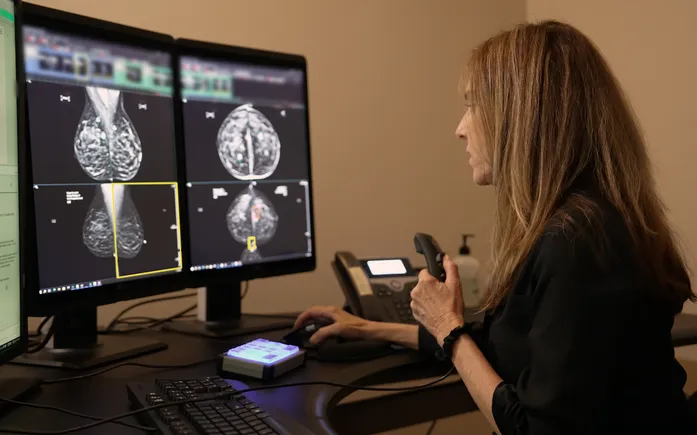Dive Brief:
- GE Healthcare has struck a deal to combine its Senographe Pristina mammography system with Radnet’s artificial intelligence-based Smartmammo workflow, the companies said Monday.
- The alliance positions GE to distribute Radnet software designed to help mammography centers view images, prioritize cases and support other steps in the workflow. The integration is the first part of a broader collaboration focused on imaging AI.
- Radnet CEO Howard Berger told analysts on an earnings call Monday that the mammogram systems “simply need a power source and a connection to the internet,” creating opportunities to image patients in “Walmart and mall locations.”
Dive Insight:
GE Healthcare has added to its AI capabilities over the past two years, inking deals to buy software from Intelligent Ultrasound and acquire Caption Health. In parallel, Radnet, which runs nearly 400 outpatient imaging centers, has developed AI capabilities through its Deephealth subsidiary.
The alliance brings GE’s imaging technology and Radnet’s software together to try to improve screening for breast cancer. Berger discussed the benefits of combining the technologies on Radnet’s third-quarter earnings call this week.
“The capabilities of the AI solutions, both clinical and generative, will be embedded onto the gantry of the GE mammography system,” Berger said. “This system will allow us to plug and play. We will be able to install these systems and simply need a power source and a connection to the internet to essentially make this function in the same way that a patient coming into a Radnet center would experience.”
Radnet has already begun to deploy mammography systems in malls and Walmart locations, and Berger framed the GE collaboration as a way to further the shift to non-traditional screening sites. The CEO said the emerging non-traditional imaging opportunity is “substantially larger than the existing conventional market.”
The software enables the use of alternative breast screening sites by supporting patient registration and billing, medical record storage and retrieval, image interpretation and other activities, Berger said. The goal is to give patients results while they are still at the imaging site.
GE has entered into a software licensing agreement with Radnet, Berger said. The arrangement allows Radnet to sell the Deephealth platform for integration with other mammography systems, Berger said, but the “embedded and fully integrated” connection with GE’s Senographe Pristina is unique.
Berger expects to be ready to roll out the systems in the first quarter of 2025. Upgrades to the GE system “that will further enhance the viewing and resolution” are awaiting Food and Drug Administration approval, the CEO added, and are slated to arrive “sometime in the second quarter of next year.”
GE disclosed the deal around two weeks after reporting its third-quarter results. Revenues rose 1% year over year, but imaging sales fell 1% on an organic basis compared with the year-ago period because of problems in China.
Like Philips and Siemens Healthineers, GE has found customers in China are delaying purchases and creating a drag on order intake and sales.

